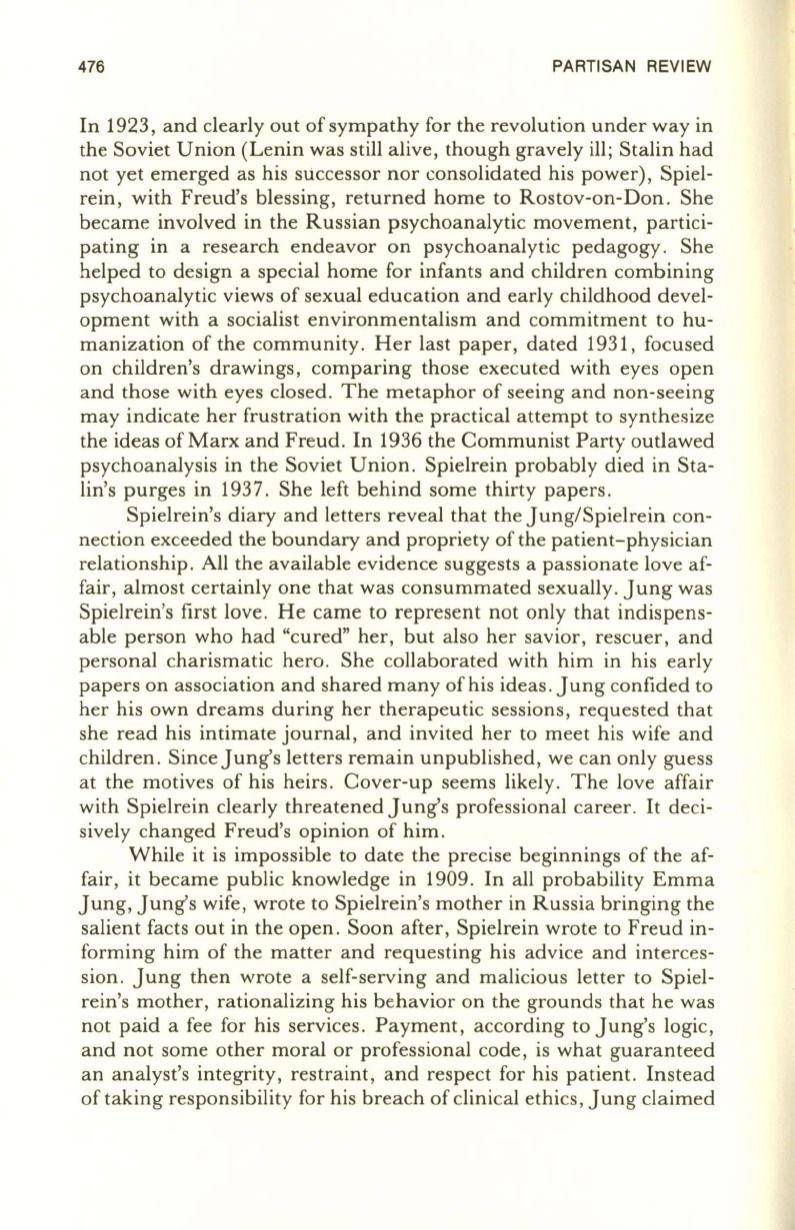
476
PARTISAN REVIEW
In 1923, and clearly out of sympathy for the revolution under way in
the Soviet Union (Lenin was still alive, though gravely ill; Stalin had
not yet emerged as his successor nor consolidated his power), Spiel–
rein, with Freud's blessing, returned home to Rostov-on-Don. She
became involved in the Russian psychoanalytic movement, partici–
pating in a research endeavor on psychoanalytic pedagogy . She
helped to design a special home for infants and children combining
psychoanalytic views of sexual education and early childhood devel–
opment with a socialist environmentalism and commitment to hu–
manization of the community . Her last paper, dated 1931, focused
on children's drawings, comparing those executed with eyes open
and those with eyes closed. The metaphor of seeing and non-seeing
may indicate her frustration with the practical attempt to synthesize
the ideas of Marx and Freud. In 1936 the Communist Party outlawed
psychoanalysis in the Soviet Union. Spielrein probably died in Sta–
lin's purges in 1937. She left behind some thirty papers .
Spielrein's diary and letters reveal that the J ung/Spielrein con–
nection exceeded the boundary and propriety of the patient-physician
relationship. All the available evidence suggests a passionate love af–
fair, almost certainly one that was consummated sexually. Jung was
Spielrein's first love . He came to represent not only that indispens–
able person who had "cured" her, but also her savior, rescuer, and
personal charismatic hero. She collaborated with him in his early
papers on association and shared many of his ideas. Jung confided to
her his own dreams during her therapeutic sessions, requested that
she read his intimate journal, and invited her to meet his wife and
children. Since Jung's letters remain unpublished, we can only guess
at the motives of his heirs . Cover-up seems likely. The love affair
with Spielrein clearly threatened Jung's professional career. It deci–
sively changed Freud's opinion of him.
While it is impossible to date the precise beginnings of the af–
fair , it became public knowledge in 1909 . In all probability Emma
Jung, Jung's wife, wrote to Spielrein's mother in Russia bringing the
salient facts out in the open. Soon after, Spielrein wrote to Freud in–
forming him of the matter and requesting his advice and interces–
sion. Jung then wrote a self-serving and malicious letter to Spiel–
rein's mother, rationalizing his behavior on the grounds that he was
not paid a fee for his services. Payment , according to Jung's logic,
and not some other moral or professional code, is what guaranteed
an analyst's integrity, restraint, and respect for his patient. Instead
of taking responsibility for his breach of clinical ethics, J ung claimed


